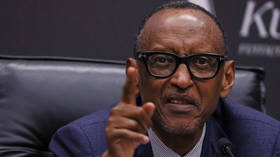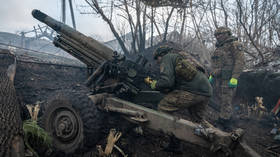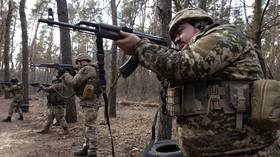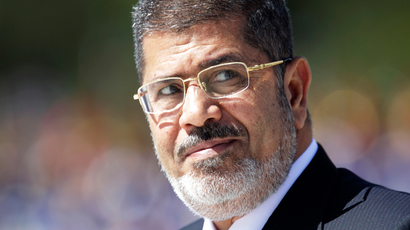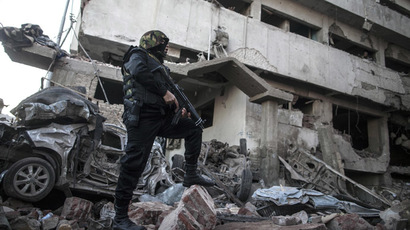Clashes, tear gas, blasts: Egypt meets third anniversary of revolution
Three years after Hosni Mubarak’s ouster, Egyptians are meeting the revolution anniversary split between the Muslim Brotherhood and the army. Relentless protests and terror acts plague the country, with at least 49 dead in clashes on Saturday.
Saturday in Cairo was set to start with marches and rallies, but kicked off with a car bomb explosion near police headquarters. This explosion injured just one person, but on Friday a series of four deadly blasts claimed the lives of six people, including four police officers. The explosion also resulted in many wounded.
Al-Qaeda-linked militant group, Ansar Bayt al-Maqdis (Supporters of Jerusalem), based in Egypt's lawless Sinai Peninsula took responsibility for the attacks in the Egyptian capital. The messages were placed in advance on jihad forums on Friday, reported the SITE monitoring service.
Big pro Sisi pro army crowds in Tahrir RT @kikhote#Tahrir 18.35 the stage lights pic.twitter.com/bOuxBjyCjS
— Liam Stack (@liamstack) January 25, 2014
Another explosion was heard near a police building in the city of Suez, state television reported. The building was a camp for riot police in the city. At least nine people were wounded.
The attacks ramped up tensions in the Egyptian capital. Crowds of angry people gathered at the site of the bomb blast that ripped open the front of Cairo's main police HQ.
The people there support the government in blaming the Brotherhood, and say it is a revenge attack on the state for overthrowing Islamist President Morsi in July 2013.
“The Brotherhood are to blame for this, the terrorists want to break the country in half,” a middle-aged man told RT.
“Some are afraid to leave their homes but most are more determined than ever to go to the streets against the Brotherhood on the revolution anniversary,” promised an elderly citizen.
“With anger mounting, there is likely to be a harsher crackdown on the Islamist group,” reports RT correspondent, Bel Trew, from the epicenter of the unrest.

The Muslim Brotherhood was formally labeled a terrorist organization in Egypt in December.
But angered supporters of the Brotherhood and its toppled President Mohamed Morsi have been defying protest bans and clashing with police in various parts of Egypt ever since.
On Saturday, clashes between police and Islamist protesters claimed at least 49 lives across the country. Most of those killed were in Cairo, but fatalities were also reported in Alexandria and the southern town of Minya. Around 247 people were wounded, according to the Health Ministry, cited by the MENA news agency.
In the capital, police had to use live rounds to disperse over 1,000 anti-government protesters. Another crowd of liberal activists attempting to rally on Tahrir Square was dispersed by firing tear gas and birdshot at people protesting against the military-backed interim government.
People running around with hand guns. Crazy. Fights around us still. Hard get out of back streets. #cairo
— Ester Meerman (@estermeerman) January 25, 2014
Remnants of teargas spread through Borsa. Leftist protesters dispersed, cops watching small groups. #Cairo#Jan25
— Mika Minio-Paluello (@mikaminio) January 25, 2014
1,079 Muslim Brotherhood supporters were arrested throughout the country, the Interior Ministry reported.
The military-installed government accuses the Brotherhood of being behind a rising insurgency and spike in terror attacks.
“The media has observed the scheme announced by the Brotherhood at their meetings abroad. They want to disable the country's political roadmap and disturb the referendum on the constitution,” Egypt’s Interior Ministry spokesman, Major General Hani Abdel Latif, told RT.

Brotherhood supporters have a contrary argument and say they are under attack from the power-hungry military, which has already placed hundreds of activists behind bars.
Muslim Brotherhood spokesman, Mohamed Soudan, has openly accused the military of staging the recent bombings “to justify massacring the opposition on the streets.”
All journalists please very careful. Mobs attacking journalists (even egyptians) accusing them of being part of Al-jazeera.Tahrir not safe
— Bel Trew - بل ترو (@Beltrew) January 25, 2014
Abayomi Azikiwe, editor of Pan-African News Wire, told RT in an interview that Egypt's government is asking for more trouble by completely turning its back on the opposition.
“The army cannot guarantee security inside Egypt as long as there is no political solution to the split that exists between the Brotherhood and the military and those allying with it,” said Azikiwe, recalling that opponents of the military-backed regime staged a “significant boycott of the referendum elections last week.”
“I believe the tensions are going to grow,” Abayomi Azikiwe shared, as long as the government continues to suppress the Muslim Brotherhood and its supporters who disagree with the current rule.
“There is potential for more conflict,” Azikiwe warned.

With tensions boiling, a new constitution gained approval from the Egyptians earlier this month. The new document broadened the army's powers and shielded the military budget from cuts, giving the armed forces the right to approve defense ministers and try civilians in military courts. But with a polarized and bitter society and revolution growing, this might not in the end prove enough to shield the army from the pendulum of public anger.
3 years ago Tahrir banner read "the people demand the fall of the regime" now it's a banner calling for Sisi to run pic.twitter.com/YsqRy7HtA5
— Sharif Kouddous (@sharifkouddous) January 25, 2014







